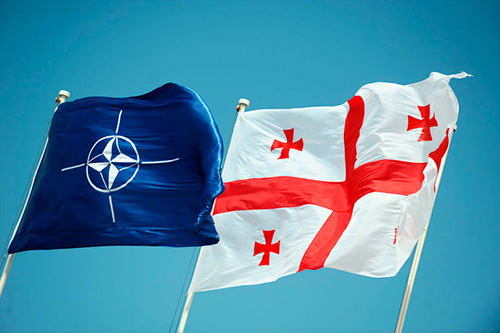
Georgia’s Thorny Path to NATO  Eugene Kogan, Tbilisi-based defence and security expert Eugene Kogan, Tbilisi-based defence and security expert
Amid heightened tensions between the U.S. and Russia over Ukraine, the issue of Georgia’s path to NATO membership is once again in the spotlight. While Tbilisi has made real progress in its military reform efforts, the major hurdle is political, not military, in nature and until the Alliance can achieve consensus, the future of Georgia’s relationship with NATO will remain uncertain. In March 2019, then-Georgian Defence Minister Levan Izoria heralded a new era in military reform: “In the past we trained our soldiers for external deployment, but the new emphasis is now on self-defence” — or rather territorial defence, a process that began to be addressed by U.S.-based military advisers in July 2016. READ MORE.
- EGF Editor |
Published on EGF: 15.12.2021
| External Relations
-
"Summit of Democracy" Puts Smaller States in a Complicated Situation  By Benyamin Poghosyan, PhD, Chairman, Center for Political and Economic Strategic Studies By Benyamin Poghosyan, PhD, Chairman, Center for Political and Economic Strategic Studies
Regardless of the intentions of the US and the future trajectory of the new world order transformation, the democracy vs. authoritarianism vision puts small states located between Russia and Europe in a complicated situation.
As the "Unipolar Moment" started to fade away after the 2008 world financial crisis, political elites, the expert community, and academicians in the different capitals of the world launched discussions and debates about the future of the world order. There was no lack of catchy terms – post-American world, multi-polar world, no polar world, polycentric world, the rise of others – which all have one common feature; there will be many players active on the geopolitical chessboard of the globe, and the US will not be able to impose its vision on all of them. The US political establishment coined its term for the emerging world order – great power competition – which is the prevailing theme in all strategic level documents published by the Trump and Biden administrations. READ MORE
- EGF Editor |
Published on EGF: 08.12.2021
| External Relations
-
Trilateral Meeting in Sochi: What’s next?  By Benyamin Poghosyan, PhD, Chairman, Center for Political and Economic Strategic Studies By Benyamin Poghosyan, PhD, Chairman, Center for Political and Economic Strategic Studies
The Russian resort town of Sochi was turned into the spotlight of South Caucasus geopolitics on November 26 as Russian President Vladimir Putin hosted Armenian PM Nikol Pashinyan and Azerbaijani President Ilham Aliyev for the much-anticipated trilateral meeting. The gathering was first announced by the Russian President’s Press-Secretary Dmitri Peskov to be held on November 8–12 to mark the first anniversary of the November 10, 2020, trilateral statement, which fixed the devastating defeat of Armenia in the 2020 Karabakh war. Some Armenian media leaked news about the upcoming meeting even earlier, arguing that another document violating Armenia and Nagorno Karabakh’s vital national interests was in the works. READ MORE
- EGF Editor |
Published on EGF: 02.12.2021
| External Relations
-
The Russian-Turkish “Co-opetition” in Eurasia and Beyond  By Yeghia TASHJIAN, Beirut-based regional analyst and researcher, columnist, "The Armenian Weekly” By Yeghia TASHJIAN, Beirut-based regional analyst and researcher, columnist, "The Armenian Weekly”
“Co-opetition” was a term coined by Adam M. Brandenburger and Barry Nalebuff to describe a paradoxical strategy of cooperation among competitors, enabling them to collectively achieve mutual gains. It’s a relatively new term in international relations and used occasionally in international trade. Nevertheless, I will be using co-opetition to explain the current status of Russian-Turkish relations.
In foreign policymaking and geopolitical self-perception, Russia and Turkey resemble each other in many ways. Throughout the course of events in the Middle East and South Caucasus, as the West failed to engage with regional developments to resolve conflicts, other regional states such as Iran, Turkey and Russia filled the political vacuum. Hence, the Turkish-Russian interaction in the Middle East and beyond has been partially facilitated by the military and political withdrawal of the US and the European Union’s absence from the region. READ MORE
- EGF Editor |
Published on EGF: 24.11.2021
| External Relations
-
Main Principles of Strategy for New Uzbekistan  By Nilufar Nodirkhonova, Head of Department Development Strategy Center By Nilufar Nodirkhonova, Head of Department Development Strategy Center
Reforms of the last five years have indeed marked a new development stage of state and society in the country. The "New Uzbekistan" concept has become a reality. Following significant changes in the country, President Shavkat Mirziyoyev ran his recent victorious election campaign based on a political platform for the coming five years titled "Strategy for the New Uzbekistan". "Over the past five years, we have gained so much experience. Our people believed in us. Now people expect us to implement new plans and programs", said Shavkat Mirziyoyev. To live up to this trust and aspirations of our people, realize their noble hopes, a Strategy of New Uzbekistan has been developed. READ MORE
- EGF Editor |
Published on EGF: 16.11.2021
| External Relations
-
The War on Formats in the South Caucasus  By Benyamin Poghosyan, PhD, Chairman, Center for Political and Economic Strategic Studies, By Benyamin Poghosyan, PhD, Chairman, Center for Political and Economic Strategic Studies,
On November 10, 2021, the South Caucasus will mark the first anniversary of the tripartite Russia – Armenia – Azerbaijan statement, which ended the 2020 Karabakh war. During the last year, the experts, representatives of civil society, and journalists hotly debated the outcomes of the war and the implications of the trilateral statement. Who benefited more from the war – Russia, Turkey, or Azerbaijan? Has the Karabakh conflict been solved or thrown into the dustbin of history, or will the region face new rounds of negotiations and the possible resumption of hostilities? What is the future of Armenia – Azerbaijan and Armenia – Turkey relations? There are no easy answers to all these questions. However, one thing is clear – a year after the 2020 Karabakh war, the South Caucasus is still in the midst of geopolitical transformation, with regional powers vying for influence. READ MORE
- EGF Editor |
Published on EGF: 16.11.2021
| External Relations
-
Is Iran making a comeback to the South Caucasus?  By Yeghia TASHJIAN, Beirut-based regional analyst and researcher, columnist, "The Armenian Weekly” By Yeghia TASHJIAN, Beirut-based regional analyst and researcher, columnist, "The Armenian Weekly”
Since the collapse of the Soviet Union 30 years ago, Iran has patiently and cautiously followed developments in the South Caucasus. Tehran’s main strategic objective has been to prevent US-Israeli penetration in the region, and it has viewed the Russian political and military presence in the region, particularly in Armenia, as a buffer zone against Western and even Turkish expansionist activities. When Turkey started to follow an independent foreign policy and came to terms with sharing power in the region with Russia, Iranian policymakers thought that Turkey—by cooperating with Russia—would reduce western influence in the region and give up its Pan-Turkic and neo-Ottoman claims. However, Iran was mistaken. READ MORE
- EGF Editor |
Published on EGF: 09.11.2021
| External Relations
-
The debate about the “Corridors War” is not based on reality  By Benyamin Poghosyan, PhD, Chairman, Center for Political and Economic Strategic Studies By Benyamin Poghosyan, PhD, Chairman, Center for Political and Economic Strategic Studies
The "corridors war", currently being hotly debated among experts, pundits, and policy-making circles in the South Caucasus, is largely based on wishful thinking rather than hard facts. In reality the options are rather limited.
Since the end of the 2020 Karabakh war, the theme of competing corridors in the South Caucasus has established itself as one of the primary topics for discussion and debate among experts, pundits, and policymaking circles. Almost daily, Azerbaijan and Turkey speak about the necessity to open the so-called "Zangezur corridor," arguing that it will significantly boost the regional economy. According to Baku and Ankara, the opening of the corridor is envisaged under the terms of the November 10, 2020, trilateral statement, even though the document itself speaks about only one corridor – Lachin. Under the term “corridor”, Azerbaijan envisages an arrangement which will allow Azerbaijani vehicles and trains to cross the Armenia – Azerbaijan border, pass via the Syunik province of Armenia and then enter the Nakhijevan Autonomous Republic (an Azerbaijani exclave), without any border, passport, and customs control implemented by the Armenian side. READ MORE
- EGF Editor |
Published on EGF: 09.11.2021
| External Relations
-
New Horizons of Cooperation Between Uzbekistan and the European Union  By Eldor Aripov, Director of the Institute for Strategic and Interregional Studies under the President of the Republic of Uzbekistan By Eldor Aripov, Director of the Institute for Strategic and Interregional Studies under the President of the Republic of Uzbekistan
Uzbekistan is on the eve of an important political event - the presidential elections in the country. This major political event was launched at the meeting of the Central Election Commission of the Republic of Uzbekistan, which took place on July 23, 2021. Today, the election campaign is in full swing, and it is taking place in a new political atmosphere. All processes are conducted openly, transparently and in accordance with the national electoral legislation and the time frames specified therein. All five parties that have nominated their candidates are actively promoting their program ideas and platforms. READ MORE
- EGF Editor |
Published on EGF: 25.10.2021
| External Relations
-
Georgia’s Mediation Moment  By Benyamin POGHOSYAN, PhD, Chairman, Center for Political and Economic Strategic Studies By Benyamin POGHOSYAN, PhD, Chairman, Center for Political and Economic Strategic Studies
Whilst Georgia has long acted as an informal home for peace building initiatives between Armenia and Azerbaijan, its recent offer of its “good offices” shows a higher level of engagement.
Ever since the end of the first Karabakh war, Georgia has become a Mecca for meetings of Armenian and Azerbaijani experts, peacebuilders, and other civil society representatives. Buzz words such as Track 2 and Track 1.5 diplomacy in the context of the Karabakh conflict settlement process could be heard very often in hotel conference halls and board rooms in Tbilisi, Bakuriani, Telavi, and other places. Given the apparent obstacles in bringing Azerbaijani experts to Armenia and Armenians to Azerbaijan, many saw Georgia as an ideal place for serious meetings and discussions and long Caucasian-style dinners. READ MORE
- EGF Editor |
Published on EGF: 25.10.2021
| External Relations
-
|
|
